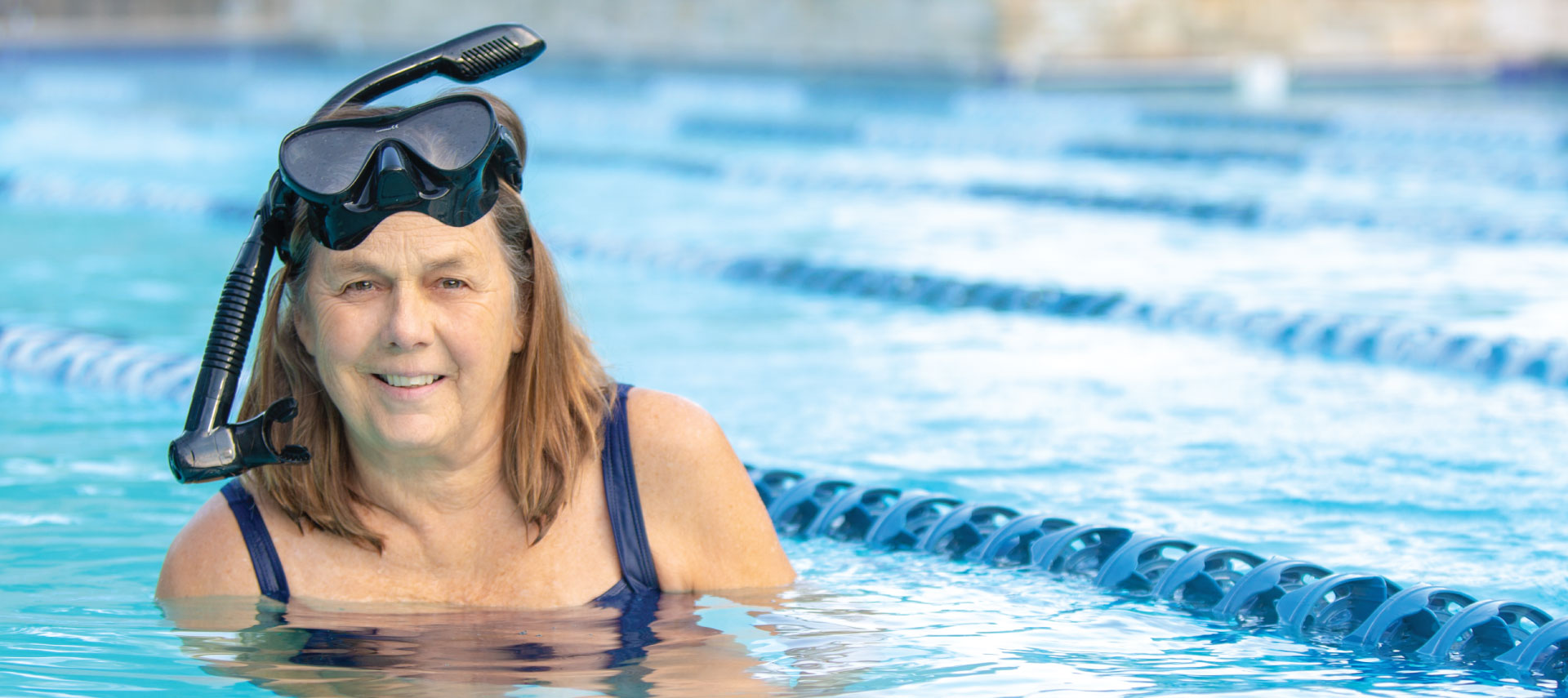
In the swim after hip replacement

Meredith Manhard loves to swim. Most mornings, she slips into her fins, adjusts her snorkel, and swims, freestyle down the outer lane of the pool at Carmel Valley Athletic Club.
In the water, nothing hurts. Particularly her hip joints which, over time, have become stiff and painful. Recently, the pain had caused her to limp.
“I’ve been having joint pain for years,” says Manhard, 72. “My diagnosis is osteoarthritis. Over time, the cartilage in my hip joint has worn away, and the space between the bones has decreased, causing bone to rub against bone.”
Manhard’s general practitioner referred her to orthopedic surgeon Dr. Christopher Meckel of Monterey Spine & Joint. Meckel determined, via imaging and examination, that Manhard would be a good candidate for a right hip replacement.
“My pain and discomfort had been affecting my mobility and my well-being for years,” she says. “I wanted the surgery as soon as possible, but I was hesitant to undergo surgery during the COVID pandemic.”
After learning about the safety practices and protocols in place at Community Hospital of the Monterey Peninsula, Manhard decided to move ahead. On Tuesday, September 8, she underwent hip-replacement surgery. On Wednesday, September 9, she went home.
“Before my surgery, Dr. Meckel introduced me to the Force patient health and fitness app, through which he electronically sends patient alerts and information,” says Manhard. “He also provided care instructions and positive thoughts through the app. It has been a great way to stay connected, get the information I need, and feel well cared for. Dr. Meckel says to be successful, I need to feel informed and supported throughout the whole experience, and this software supported that.”
Before surgery, Manhard met with Community Hospital’s Orthopedic Center nurse navigator and was seen in the preoperative clinic for tests and a thorough review of her medical history. She also received a binder from the Orthopedic Center, with information essential to managing her joint-replacement process.
"The Force program got me into the mindset that I need to participate in the process and my own healing."
— Meredith Manhard
“The Force program got me into the mindset that I need to participate in the process and my own healing,” Manhard says. “I need to eat well, which includes a lot of protein, do my assigned exercises, and have a designated caregiver to help manage my meds and assist me. I couldn’t go home without an identified caregiver.”
She identified Scott Manhard, her husband of 40 years, as her coach/caregiver.
“Caregiving is not easy, and Scott’s doing a great job,” says Manhard, a retired dietitian for Carmel Valley Manor. “It’s good to have someone who knows me so well and is right there for me.”
As her coach and caregiver, Scott talked with the Orthopedic Center coordinator for a thorough review of how to support his wife’s recovery. The binder was a valuable tool; the “Life after Joint Replacement” section, in particular, explained how to maneuver daily tasks, such as showering, walking, sitting, and climbing stairs.
“Dr. Meckel did my surgery from an anterior approach, coming in from the front to replace my hip joint,” said Manhard. “This was better for me than a posterior approach, he said, which would have caused more restriction of movement. Even right after the surgery, I had more range of movement. I could already bend down — not that I wanted to quite yet.”
Manhard’s biggest challenge was learning how to manage early pain. “We didn’t medicate soon enough, so we let the pain get away from us. We learned you have to stay ahead of the pain.”
She began physical therapy one week after her surgery and had her first follow-up doctor’s appointment at six weeks.
“I’m told it takes a full year for everything to heal,” she says.
“As much as Community Hospital and the Force program did to prepare me, I still was surprised at how challenging the recovery has been for me. That’s why it’s so important to have the ongoing support throughout the whole experience.”

